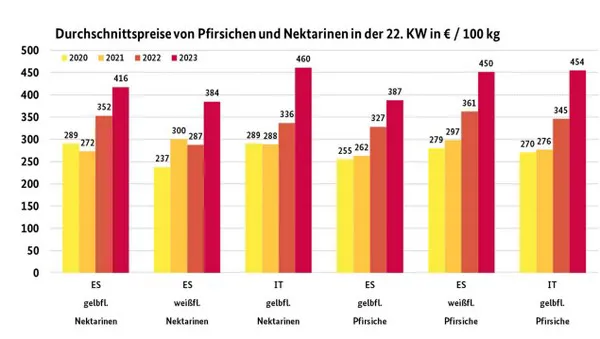In line with the seasonal situation, Spanish shipments predominated for both peaches and nectarines. They were flanked by Italian goods. The first fruits from Greece appeared in Frankfurt and Munich, but the quality was not always convincing. According to the BLE, availability had expanded slightly overall and was sufficient to meet demand.
Demand was not particularly strong. Nevertheless, traders were usually able to increase their demands, provided the organoleptic properties were okay. However, prices for smaller fruit could be seen to drop, as these were less in demand. The first French deliveries are expected in week 23.

Apples
Although domestic products continued to predominate, their presence was limited and their quality often left something to be desired. The importance of Italian and French batches also diminished. In Berlin, Polish products appeared in greater numbers.
Pears
South African and Chilean offerings clearly dominated the market. Fruit from Argentina played a minor role. Fruits from Belgium, the Netherlands, Turkey and Italy only had a local, supplementary character. Availability shrunk, but was still sufficient to satisfy the demand.
Table grapes
Chilean and South African deliveries were limited, in line with the season. Italian and Egyptian goods gained in importance: Italian Victoria and Black Magic as well as Egyptian Prime Seedless, Flame Seedless and Early Sweet were mostly convincing, quality-wise.
Strawberries
Local fruits predominated. They were mostly flanked by Dutch items. Goods from Belgium, Greece, Poland and Spain did not have more than a supplementary status. Due to the summer weather and the associated increase in harvest, availability expanded noticeably.
Cherries
Spanish deliveries clearly dominated the market and sometimes they did not have any competition. In terms of importance, Greek and Italian shipments followed, while Turkish shipments were only of a supplementary nature. Availability was by no means too abundant. Prices shifted upwards, in some cases quite markedly.
Apricots
Spanish deliveries clearly dominated the scene. Deliveries from Italy came in behind them. French and Turkish supplies played only a minor role. Supply had expanded. It outstripped sales, which had become somewhat limited all in all.
Lemons
Spanish Verna and South African Eureka predominated. Goods from Italy, Greece, Zimbabwe and Turkey were only supplementary. A slow business led to stable prices.
Bananas
Usually, supply and demand balanced each other out sufficiently, so that traders did not have to modify their previous prices. Only Munich reported limited sales, due to the Whitsun holidays.
Cauliflower
Domestic goods prevailed by a wide margin. Only supplementary supplies came from Belgium, Italy and the Netherlands. Overall, availability had expanded. Domestic products, which in some places were the only ones available, could generally be sold without difficulty.
Lettuce
Sales were quite slow for these. Iceberg lettuce came in mainly from the domestic market and the Netherlands. Spanish goods had already left the scene here and there. Lettuce, colorful lettuces and endives came in exclusively from Germany and Belgium. Business was very slow.
Cucumbers
Domestic or Belgian or Dutch products represented the largest share of the assortment. Availability usually increased, sometimes quite significantly. Demand could not always keep pace. Traders tried to counteract growing surpluses by granting discounts.
Tomatoes
Belgian and Dutch lots clearly dominated the scene. These were followed by domestic and Italian batches, which, however, only had a complementary character. Demand was not bad, but could be satisfied without any problems.
Sweet peppers
Dutch and Belgian deliveries predominated. Business was mixed: Munich and Berlin reported unexcited marketing with almost stable prices, while on the other markets prices fluctuated quite a bit. In Hamburg, at least, sales improved as a result of concessions granted.
Asparagus
As usual at this time of the season, domestic lots dominated the scene. They were flanked by small volumes from Greece, Poland and the Netherlands. At the start of the week, the surpluses from week 21 had to be reduced, which of course worked best with discounts.
Source: BLE
